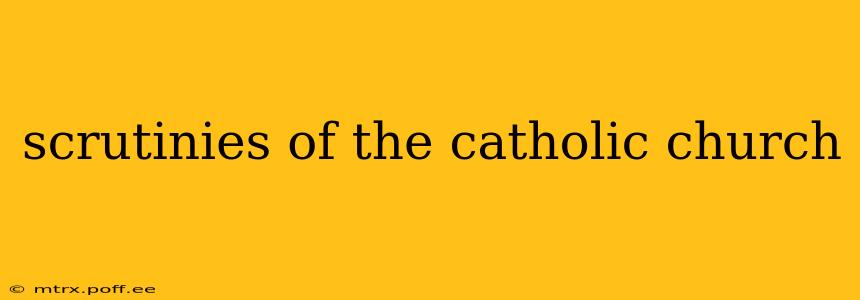The Catholic Church, as one of the world's oldest and largest religious institutions, has been subject to numerous scrutinies throughout its history. These examinations range from theological debates and internal reforms to external criticisms concerning its doctrines, practices, and historical actions. Understanding these scrutinies requires a nuanced approach, acknowledging both the Church's efforts at self-correction and the persistent challenges it faces. This article delves into various aspects of these scrutinies, aiming to provide a comprehensive overview.
What are the Main Criticisms of the Catholic Church?
Criticisms of the Catholic Church are diverse and span centuries. Some of the most prominent include:
-
Doctrinal issues: The Church's stances on topics such as contraception, abortion, homosexuality, and the role of women have drawn considerable criticism, particularly from those who advocate for greater inclusivity and social justice. These debates often center on interpretations of scripture and tradition.
-
Historical controversies: The Church's past involvement in events like the Crusades, the Inquisition, and the suppression of scientific inquiry has been subject to intense scrutiny and condemnation. Historians continue to debate the extent of the Church's responsibility and the motivations behind these actions.
-
Abuse scandals: The widespread sexual abuse of minors by clergy and the subsequent cover-ups have arguably been the most damaging criticisms in recent decades. These scandals have eroded public trust and sparked calls for greater accountability and transparency within the Church.
-
Financial practices: The Church's vast wealth and its management of financial resources have also attracted criticism. Questions have been raised about transparency and the use of funds for charitable purposes versus administrative expenses.
-
Political involvement: The Church's historical and contemporary involvement in politics has drawn criticism from those who advocate for a separation of church and state. This involves debates about the Church's influence on legislation and its stance on social and political issues.
What are the Major Reforms within the Catholic Church?
The Catholic Church has undertaken various reforms throughout its history, often in response to internal and external pressures. Key examples include:
-
The Council of Trent (1545-1563): This council addressed the challenges posed by the Protestant Reformation, clarifying Catholic doctrines and implementing reforms aimed at strengthening the Church's structure and discipline.
-
The Second Vatican Council (1962-1965): This landmark council initiated significant changes in the Church's liturgical practices, its relationship with other religions, and its engagement with the modern world. It encouraged greater participation of the laity and promoted ecumenism.
-
Ongoing efforts to address sexual abuse: In recent years, the Church has made efforts to address the sexual abuse crisis through improved accountability measures, stricter background checks, and greater transparency. However, these efforts remain controversial and are subject to ongoing debate about their effectiveness.
How Does the Catholic Church Respond to Criticism?
The Catholic Church's response to criticism varies depending on the nature and context of the critique. Often, the response involves theological discussion, historical clarification, and apologies for past wrongs. However, the Church's response has also been criticized for being insufficient or defensive, especially in the case of sexual abuse scandals. Efforts towards dialogue and reconciliation are ongoing, but the Church faces the persistent challenge of balancing its traditional teachings with the demands of a changing world.
What is the Future of the Catholic Church?
The future of the Catholic Church is uncertain, shaped by ongoing demographic shifts, evolving societal values, and the challenges posed by secularization. The Church faces the task of adapting to a world that is increasingly pluralistic and secular while maintaining its core beliefs and traditions. The effectiveness of its responses to criticisms and its capacity for internal reform will significantly shape its future trajectory.
How Does the Catholic Church Justify Its Actions?
The Church justifies its actions primarily through appeals to scripture, tradition, and its understanding of divine revelation. These justifications are often interpreted differently by various groups within and outside the Church. The Church also emphasizes its charitable work, its role in providing education and healthcare, and its contributions to social justice as mitigating factors against criticisms of its past actions and current policies.
This article provides a broad overview of the scrutinies facing the Catholic Church. Further research into specific historical events, theological debates, and social issues is encouraged for a deeper understanding of this complex and multifaceted institution.
